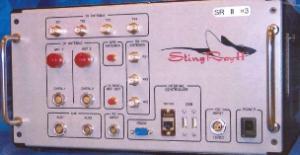The cops have a nifty little tech toy that can track your phone to within a few feet. Should they need a search warrant first?
Medical marijuana bills are popping up all over the place, a federal bill to protect medical marijuana businesses from asset forfeiture has been filed, and more.
This week, it should be "This Week's Corrupt Jail Guards," since that's all we've got.
Connecticut legislators prepare to take up marijuana legalization, Wisconsin legislators look set to pass a CBD bill this year, Indiana's new governor will ease up on needle exchange restrictions, and more.
Both Congress and state legislatures are getting back to work and the bills are starting to pile up, South Dakota activists eye a 2018 legalization initiative, and more.
Sen. Jeff Sessions is on the hotseat today and Wednesday during his Senate confirmation hearings, Missouri activists gear up for a 2018 legalization initiative, and more.
Marijuana legalization bills get filed in Guam and the District of Columbia, the Global Drug Policy Commission asks Obama to commute more sentences, Chris Christie vows to fight drug addiction during his last year in office, and more.
The National Academy of Sciences releases a report finding marijuana is medicine, Rhode Island legislators aim to get pot legal in a hurry, a new bill in Washington state would allow home cultivation, and more.
special to Drug War Chronicle by independent investigative journalist Clarence Walker, [email protected]
Raymond Lambis is a free man -- at least for now.
He was looking at 10 years to life on federal drug charges, but the case was built on a controversial technology -- "
Stingray" -- and in a precedent-setting 2016 decision widely celebrated by legal experts and privacy advocates, a federal judge ruled that use of the device without a search warrant violated the
Fourth Amendment's proscription against unreasonable search and seizure.
The decision -- and the technology -- has implications that go far beyond the shadowy world of drug dealers and DEA agents. Stingray is a generic term for a cell-site simulator, a device that can mimic cell towers as a means of tracking down cell phones. Law enforcement can use Stingray to pick up phone calls, voicemail messages, and text messages, and to pinpoint the physical location of a targeted phone to within a few feet.
In the Lambis case, federal prosecutors argued that they didn't need a warrant to use the wide-ranging Stingray, but federal district court Judge William H. Pauley shot them down.
"Absent a search warrant," Judge Pauley held in his 14-page opinion, "the government may not turn a citizen's cell phone into a tracking device."
But that's exactly what DEA agents did to build their case against Lambis. They used Stingray to locate his cell phone inside his family residence, then conducted a warrantless search of his bedroom and uncovered a large amount of cocaine.
Federal prosecutors had a fallback argument -- that even if a warrant were necessary to track Lambis' phone, once his father gave agents at his door permission to enter and Lambis then "consented" to a search, the search should be allowed -- but Pauley wasn't having that, either.
"The procurement of a 'voluntary' consent to search based upon a prior illegal search taints that consent," he held.

US District Court Judge William H. Pauley
But if federal prosecutors have their way, the DEA and other federal agents will be able to do it again. In September, prosecutors from the US Attorneys Office for the Southern District of New York
filed an appeal of Pauley's decision with the US 2
nd Circuit Court of Appeals.
"We're obviously disappointed about that," Lambis' attorney Alan Seidler told Drug War Chronicle.
So is the Electronic Frontier Foundation. Rebecca Jeschke, a digital rights analyst for the group, told the Chronicle that if the government wins on appeal, everyone's privacy will be eroded.
"As we use cell phones more and more, a successful appeal will touch nearly every American," she said.
A successful appeal would be salt in the wounds of legal scholars and privacy advocates who hailed Pauley's forceful decision in Lambis as a major victory against warrantless surveillance by the government.
"This is the first federal ruling I know of where a judge squarely ruled that the Fourth Amendment required police to get a warrant to use a Stingray, and further, suppressed evidence derived from warrantless use of the technology," ACLU Attorney Nathan Wessler told the New York Times at the time. "After decades of secret and warrantless use of Stingray technology by law enforcement to track phones, a federal judge has finally held authorities to account."
According to an ACLU report, at least 60 state, local, and federal law enforcement agencies in 23 states have used Stingray to suck up citizens' cell phone data.
Stingray in the Lambis Case
According to court documents, the trail to Raymond Lambis' front door began with a DEA investigation into an alleged drug pipeline importing large amounts of cocaine from South America beginning in early 2015. DEA agents obtained a wiretap warrant to glean information about the numbers dialed from a specific cell phone.
After agents obtained the warrant, they monitored messages off a Blackberry between two suspected drug traffickers. During one particular conversation agents overheard a voice referring to someone named "Patilla," whose phone had a 646 area code.
Messages between Patilla and the other, unnamed party indicated that Patilla could supply hydrochloric acid, which is used by traffickers in the heroin-refining process. DEA agents then got a warrant to order the phone company to provide "approximate location," or "cell-site location information" (CSLI).
A frequent complaint of defense attorneys and privacy advocates has been that law enforcement, and DEA agents in particular, will mislead judges into thinking the warrant they sign off on is to get specific cell-site information from a carrier when what agents are really doing is using Stingray to locate a person's phone or actual address. As the Chronicle reported in 2013, "The Stingray technology not only raises Fourth Amendment concerns, it also raise questions about whether police withhold information from judges to monitorcitizens without probable cause.That's what happened in Lambis.
In the Lambis case, DEA Special Agent Kathryn Glover obtained a warrant seeking cell-site data and location information for that 646 phone, but did not tell the judge DEA would be using Stingray to conduct a search to pin down Lambis' exact location.
"So they went to the effort to get a warrant, but then didn't tell the judge they intended to use that same warrant to use a Stingray," ACLU technology specialist Christopher Soghoian told Ars Technica. "It is so important for federal courts to recognize that use of a Stingray is a search of a Fourth Amendment-protected place, and not only is a warrant required, but the court authorizing the surveillance must be told they are authorizing the use of a Stingray."
But the phone carrier's CSLI data, which Agent Glover said in her warrant application would be used to track down the 646 phone, only guided DEA agents to the "general area" of Broadway and 177th Street in Manhattan. To pinpoint the 'house or building where the phone most likely resided with its owner the DEA unleashed Stingray to first zero in on the exact building and then on the exact apartment.
A DEA technician using a hand-held Stingray walked through the building until he picked up the strongest signal -- coming from inside the Lambis apartment. Then, DEA agents knocked on the door, and Lambis' father allowed the gun-toting agents inside. When agents asked if anyone else lived there, the elderly man knocked on his son's door, and Lambis opened it up only to be confronted by the DEA.
Faced by the agents in his home, he then consented to a search of his bedroom, where agents discovered a kilo of cocaine, empty ziplock bags, a scale, and eight cell phones. He was charged with possession of cocaine with intent to distribute and other drug-related charges. It was Lambis' defense motion to throw out that evidence as a result of an unlawful search that led to Pauley's ruling.
The States Aren't Waiting for the Federal Courts
The courts aren't the only place Stingray is running into headwinds. Thanks to decisions like that in the Lambis case, some states have begun passing privacy legislation aiming at protecting citizens' cell phone data from warrantless searches by Stingray or similar cell-site simulators used by police. Among them are California, Illinois, Minnesota, Rhode Island, Virginia, and Washington.
"Citizens have the right to expect that they will not have their personal information investigated by police without a warrant," said Rep. Edith H Ajello (D-Providence) after passage of a 2016 Rhode Island bill that prohibits obtaining cell phone data by cell-site technology.
"Requiring a warrant won't make it difficult for police to do their job," concurred Sen. Donna Nesselbush (D-North Providence). "It's essentially updating search warrant law for the information age."
"As advances in technology enable police to more efficiently investigate and solve crimes, it's important that we help them to know they are following state laws and the Constitution," said Illinois Sen. Daniel Bliss (D-Evanston) upon passage of similar legislation there in 2016. That law, the Citizen Privacy Protection Act, went into effect January 1.
While the states aren't waiting for the federal courts to provide protections, the Lambis decision and related controversies over Stingray technology have created such a firestorm that the Justice Department and the Department of Homeland Security are now requiring agents to obtain a warrant before using Stingray in investigations. But that could change if the appeals court rules in the government's favor. Stay tuned.
Journalist Clarence Walker can be reached at [email protected].
back to top
Medical marijuana bills are popping up all over the place, a federal bill to protect medical marijuana businesses from asset forfeiture has been filed, and more.

MMJ leaf and stethoscope KY ODCP_151_105.jpg
Last Thursday, a federal bill to protect medical marijuana businesses from asset forfeiture was filed. Rep. Earl Blumenauer (D-OR) filed House Resolution 331, which would shield medical marijuana-related conduct authorized by state law from federal asset forfeiture attempts. The bill has been referred to the House Judiciary and Energy and Commerce committees.
Connecticut
On Wednesday, a medical marijuana expansion hearing was scheduled. A panel of eight physician specialists will hear public testimony on expanding medical conditions covered by the state's medical marijuana law Wednesday. Patients are expected to ask the panel to expand the law to include conditions such as eczema, arthritis, and fibromyalgia. The panel will make a recommendation to the Consumer Protection Commissioner, who can then propose the change to a legislative oversight committee, which would make a final decision. The whole process could take a year or more.
Indiana
Last Friday, a medical marijuana bill was filed. State Sen. Karen Tallian (D-Indianapolis) has filed Senate Bill 255, which would allow patients with a specified list of conditions or "any persistent or chronic illness or condition" to use medical marijuana with a physician's recommendation. The measure would also create a statewide medical marijuana program. Tallian has introduced similar bills in past years that have gone nowhere.
Minnesota
On Monday, a key legislator filed a bill to block any new qualifying conditions. Longtime medical marijuana skeptic and former House Majority Leader Rep. Matt Dan (R-Dellwood) has filed a measure, House File 120, that would block the state health commissioner from adding new qualifying conditions to the state's medical marijuana law. It's a power that has been used sparingly -- "intractable pain" was added after a year's wait -- but Dean wants it used not at all. His bill would accomplish that by striking out the phrase "or any other medical condition or its treatment approved by the commissioner."
Mississippi
Last Friday, a medical marijuana bill was filed. Rep. Joel Bomgar (R-Madison) has filed House Bill 179, which would ensure that any "qualifying patient who possesses a valid registry identification card is not subject to arrest, prosecution, or penalty in any manner." The bill specifies a list of qualifying conditions, allow for caregivers for patients who can't grow their own, and allow for dispensaries. Patients could possess up to 2. 5 ounces of marijuana.
Nebraska
Last Friday, a state senator said she would file a medical marijuana bill this session. State Sen. Anna Wishart (D-Lincoln) says she will introduce a comprehensive medical marijuana bill this session. A similar measure came within three votes of advancing last year, but the measure would still face an uphill battle in the legislature and a probable veto from Gov. Pete Ricketts (R).
New Mexico
Last Friday, a medical marijuana expansion bill was filed. State Sen. Cisco McSorly (D-Albuquerque) has filed Senate Bill 8, which would more than double the amount of medical marijuana licensed producers can grow in the state and expand the amount of marijuana that patients could possess. "This bill will guarantee there is an adequate supply of marijuana for our patients," McSorley said.
South Carolina
On Tuesday, a medical marijuana bill was filed. State Sen. Tom Davis (R-Beaufort) and state Rep. Peter McCoy (R-Charleston) Tuesday filed identical versions of the South Carolina Compassionate Care Act (Senate Bill 212) at the statehouse. The bill would allow qualifying patients with debilitating medical conditions and a recommendation from their doctor to use medical cannabis.
Wisconsin
Last Thursday, prospects for passage of a CBD bill brightened after a key legislator waived objections. Legislation to allow the use of CBD cannabis oil could pass this year after key opponents last year said they would get out of the way this year. The Assembly passed a CBD bill last year, only to see it derailed in the Senate by opposition from three Senate Republicans, Leah Vukmir, Duey Stroebel, and Mary Lazich. Vukmir now says she will support a CBD bill, Stroebel is staying silent, and Lazich is gone. The bill is expected to be introduced later this month.
[For extensive information about the medical marijuana debate, presented in a neutral format, visit MedicalMarijuana.ProCon.org.]
back to top
This week, it should be "This Week's Corrupt Jail Guards," since that's all we've got. Let's get to it:
In Houma, Louisiana, a Lafourche Parish jail guard was arrested last Tuesday on drug trafficking charges. Guard LaShanta Williams, 36, went down after a two-month investigation into drugs being sent from California. Williams's brother was the actual target of the investigation, but after he was arrested, Williams allegedly returned to the home she shared with him and removed evidence. She is charged with obstruction of justice and transactions involving proceeds from drug offenses.In Sevierville, Tennessee, a Sevier County jail guard was arrested last Thursday for smuggling drugs into the county jail. Corrections Officer Joshua Davis, 24, went down after authorities received a tip that he was plotting with an inmate and the inmate's mother to bring narcotics into the jail and searched him when he arrived at work and found drugs. He is charged with introducing contraband into a penal facility, criminal conspiracy, and possession of Schedule III drugs. The inmate and his mother were also arrested.
back to top
Connecticut legislators prepare to take up marijuana legalization, Wisconsin legislators look set to pass a CBD bill this year, Indiana's new governor will ease up on needle exchange restrictions, and more.

Legal weed could be coming to Connecticut. (Wikimedia)
Legalization Bills Filed in Connecticut. At least three pot legalization bills have been filed for the looming session of the state legislature, including one from state Rep. Melissa Ziobron (R-East Hampton) and one from Senate President Pro Tem Martin Looney (D-New Haven). Only Looney's bill yet shows up on the state legislative website. It is Senate Bill 11.
Medical Marijuana
After Key Legislator Waives Objection, Wisconsin Could See CBD Bill Passed. Legislation to allow the use of CBD cannabis oil could pass this year after key opponents last year said they would get out of the way this year. The Assembly passed a CBD bill last year, only to see it derailed in the Senate by opposition from three Senate Republicans, Leah Vukmir, Duey Stroebel, and Mary Lazich. Vukmir now says she will support a CBD bill, Stroebel is staying silent, and Lazich is gone. The bill is expected to be introduced later this month.
Heroin and Prescription Opioids
Wisconsin Governor Calls for Legislative Special Session on Heroin. Gov. Scott Walker (R) said Thursday he will order a special session of the legislature to "fight heroin addiction." He is also calling on state agencies to ramp up their responses to opioid use in the state. "This is a public health crisis, and that's why I'm calling a special session of the Legislature and directing state agencies to ramp up the state's response," Walker said. Opioid overdose deaths have been on the rise in the state for nine straight years. Walker is eyeing a package of bills that include expanding access to naloxone, Good Samaritan 911 protections for reporting overdoses, a civil commitment procedure for addicts, and requiring codeine-containing cough syrups to be prescription-only.
Harm Reduction
Indiana's Incoming Governor to Ease Pence's Needle Exchange Restrictions. Governor-to-be Eric Holcomb (R) vowed Thursday to roll back restrictions on needle exchanges signed into law by his predecessor, Vice President-elect Mike Pence. Holcomb said local -- not state -- officials should be able to authorize needle exchanges. Holcomb has also created a "drug czar" position within his incoming administration, which will, among other duties, seek increased funding for needle exchanges.
back to top
Both Congress and state legislatures are getting back to work, and the bills are starting to pile up; South Dakota activists eye a 2018 legalization initiative, and more.

Medical marijuana bills are being filed in the states that have yet to embrace it. (Wikimedia)
Some California Dispensaries Are Already Selling Marijuana to All Adult Comers. Legal recreational marijuana sales won't begin in the state until at least 2018, but some medical marijuana dispensaries are already selling pot to anyone over 21. "Dozens" of dispensaries are advertising that they no longer require a doctor's recommendation to make purchases. Many, if not all, of these "Prop 64 friendly" dispensaries are unlicensed.
South Dakota Activists Eye 2018 Legalization Initiative. The state has twice rejected medical marijuana at the polls, but that isn't stopping a new group, New Approach South Dakota, from planning a 2018 legalization initiative. The group says it will submit a proposal to the attorney general's office next week.
DC Mayor Announces Plan to End Driver's License Suspensions for Drug Offenses. Mayor Muriel Bowser (D) said Monday that her administration plans to change a law that suspends the driver's license of people arrested for drug offenses. "In Washington, DC, we value and support rehabilitation and promote employment as a critical component of successful reentry," Mayor Bowser said in a statement. "This change will ensure that the DC criminal code is tailored to public safety, not maintaining antiquated and ineffective policies that place unnecessary burdens on District residents."
Medical Marijuana
Federal Bill to Protect Medical Marijuana Businesses From Asset Forfeiture Filed. Rep. Earl Blumenauer (D-OR) last Thursday filed House Resolution 331, which would shield medical marijuana-related conduct authorized by state law from federal asset forfeiture attempts. The bill has been referred to the House Judiciary and Energy and Commerce committees.
Mississippi Medical Marijuana Bill Filed. Rep. Joel Bomgar (R-Madison) has filed House Bill 179, which would ensure that any "qualifying patient who possesses a valid registry identification card is not subject to arrest, prosecution, or penalty in any manner." The bill specifies a list of qualifying conditions, allow for caregivers for patients who can't grow their own, and allow for dispensaries. Patients could possess up to 2. 5 ounces of marijuana.
Indiana Medical Marijuana Bill Filed. State Sen. Karen Tallian (D-Indianapolis) has filed Senate Bill 255, which would allow patients with a specified list of conditions or "any persistent or chronic illness or condition" to use medical marijuana with a physician's recommendation. The measure would also create a statewide medical marijuana program. Tallian has introduced similar bills in past years that have gone nowhere.
Nebraska Medical Marijuana Bill Coming Soon. State Sen. Anna Wishart (D-Lincoln) says she will introduce a comprehensive medical marijuana bill this session. A similar measure came within three votes of advancing last year, but the measure would still face an uphill battle in the legislature and a probable veto from Gov. Pete Ricketts (R).
New Mexico Medical Marijuana Fix Bill Filed. State Sen. Cisco McSorly (D-Albuquerque) has filed Senate Bill 8, which would more than double the amount of medical marijuana licensed producers can grow in the state and expand the amount of marijuana that patients could possess. "This bill will guarantee there is an adequate supply of marijuana for our patients," McSorley said.
Kratom
Florida Bill to Make Kratom a Controlled Substance Filed. State Rep. Kristin Jacobs (D-Coconut Grove) last Friday filed House Bill 183, which would add mitragynine and hydroxymitragynine, the psychoactive components of kratom, to the state's controlled substances act. Under the bill, selling, manufacturing, or importing kratom would be a misdemeanor.
Collateral Consequences
Nebraska Bill Would (Mostly) End Lifetime Ban on Food Stamps for Drug Felons. State Sen. Mike Groene (R-North Platte) last Friday filed Legislative Bill 128, which would end the lifetime ban on food stamps for drug felons, but only if they got drug abuse treatment after their most recent conviction. Alternately, drug felons could take and pass voluntary drug tests every six months to qualify. People with more than two drug felonies would continue to be banned from receiving food stamps. A measure to completely end the ban failed last year.
Harm Reduction
Federal Bill Filed to Ease Access to Overdose Reversal Drug. Rep. Jan Schakowsky (D-IL) and a bipartisan group of 18 cosponsors have filed House Resolution 304, which would ease bureaucratic obstacles to emergency medical care providers wishing to administer the opioid overdose reversal drug naloxone. The bill has been referred to the House Judiciary and Energy and Commerce committees.
back to top
Sen. Jeff Sessions is on the hotseat today and Wednesday during his Senate confirmation hearings, Missouri activists gear up for a 2018 legalization initiative, and more.

Sen. Jeff Sessions left the marijuana situation still muddied Tuesday. (senate.gov)
Sessions Evades Firm Answer on State Marijuana Laws, Leaves Door Open for Federal Enforcement. During his confirmation hearing for the position of Attorney General Tuesday, Sen. Jeff Sessions (R-AL) avoided giving a straight answer on how he will handle states that have legalized marijuana. When asked by Sen. Patrick Leahy (D-VT) if he would use Justice Department resources to prosecute medical marijuana patients in states where it is legal, Sessions replied, "I won't commit to never enforcing federal law… but absolutely it is a problem of resources for our federal government. And when asked by Leahy if he agreed with Obama Justice Department guidelines that have largely allowed marijuana legalization to proceed at the state level, Sessions responded with evasion. When asked by Sen. Mike Lee (R-UT) about states' right to experiment with marijuana legalization, Sessions responded that marijuana was illegal at the federal level: "One obvious concern is the United States Congress has made the possession in every state and distribution an illegal act. If that's' something that's not desired any longer Congress should pass a law to change the rule, it is not the Attorney General's job to decide what laws to enforce."
Missouri Legalization Initiative Approved for Signature Gathering. Missouri came just a couple of dozen of signatures away from being able to vote on marijuana legalization in 2016, and activists there are already gearing up for 2018. A legalization initiative has been approved for signature gathering. It would make marijuana legal for people 21 and over, and medical marijuana would be legal for minors with a doctor's permission.
Medical Marijuana
Connecticut Medical Marijuana Expansion Hearing Wednesday. A panel of eight physician specialists will hear public testimony on expanding medical conditions covered by the state's medical marijuana law Wednesday. Patients are expected to ask the panel to expand the law to include conditions such as eczema, arthritis, and fibromyalgia. The panel will make a recommendation to the Consumer Protection Commissioner, who can then propose the change to a legislative oversight committee, which would make a final decision. The whole process could take a year or more.
South Carolina Medical Marijuana Bill Filed. State Sen. Tom Davis (R-Beaufort) and state Rep. Peter McCoy (R-Charleston) Tuesday filed identical versions of the South Carolina Compassionate Care Act (Senate Bill 212) at the statehouse. The bill would allow qualifying patients with debilitating medical conditions and a recommendation from their doctor to use medical cannabis.
Key Minnesota GOP Legislator Wants to Block Any New Qualifying Conditions. Longtime medical marijuana skeptic and former House Majority Leader Rep. Matt Dan (R-Dellwood) has filed a measure, House File 120, that would block the state health commissioner from adding new qualifying conditions to the state's medical marijuana law. It's a power that has been used sparingly -- "intractable pain" was added after a year's wait -- but Dean wants it used not at all. His bill would accomplish that by striking out the phrase "or any other medical condition or its treatment approved by the commissioner."
back to top
Marijuana legalization bills get filed in Guam and the District of Columbia, the Global Drug Policy Commission asks Obama to commute more sentences, Chris Christie vows to fight drug addiction during his last year in office, and more.

Iran has already executed ten drug offenders this year, with another dozen set to face the gallows. (iranhr.org)
Guam Governor Files Legalization Bill. Gov. Eddie Calvo Tuesday introduced a bill to legalize marijuana on the US island territory. "I am introducing this bill, not because I personally support the recreational use of marijuana, but as a solution to the regulatory labyrinth that sprouted from the voter-mandated medical marijuana program," Calvo said in a press release. The measure would legalize marijuana for people over 21 and impose a 15% tax on sales. Medical marijuana patients would be exempt from the tax.
DC Councilmember Files Bill for Legal Marijuana Commerce and Regulation. Councilmember David Grosso Tuesday filed a bill to establish a full tax and regulatory framework for legal marijuana commerce. If passed, the bill would put the District in conflict with Congress, which must approve city spending. But Grosso said that Congress had forced the District's hand with its meddling in city affairs.
Drug Policy
New Jersey Governor Vows to Heighten Fight Against Drug Addiction. In his final state of the state address, Gov. Chris Christie (R) said he will spend his last year as governor fighting drug addiction. "Our state faces a crisis which is more urgent to New Jersey's families than any other issue we could confront," Christie told the legislature in Trenton. "Beyond the human cost, which is incalculable, there is a real cost to every part of life in New Jersey." Christie is pushing for treatment instead of jail for nonviolent drug offenders, expanded drug courts, and expanded needle exchange programs, among other initiatives.
Law Enforcement
Federal Bill to Clear Way for more Surplus Military Gear for Police Filed. Rep. John Ratcliffe (R-TX) has filed House Resolution 426, which would bar the federal government from limiting the sale or donation of excess federal property to state and local agencies for law enforcement purposes. The bill is a response to the Obama administration's short-lived decision last year to block the transfer of military-style equipment to domestic police forces.
Sentencing
Global Drug Policy Commission Asks Obama to Free More Prisoners. In an open letter to the outgoing president, the commission, which includes a number of former heads of state, thanked Obama for his efforts to shift from a punitive approach to drugs, noted that he had freed more than a thousand drug war prisoners through his clemency program, and asked for more: "We hope that in these final days of your presidency, you will use the power of your office to commute even more prison sentences of low-level drug offenders, and restore dignity and hope to their lives," the commission wrote. "May your example inspire not only your successor, but also governors across the country."
International
Colombia Coca Cultivation Set to Increase. Colombia's post-conflict minister, Rafael Pardo, said Tuesday that coca cultivation will increase this year, the third year in a row that has seen increases in the country's coca crop. Pardo said part of the reason was the government's turn away from using aerial eradication, but that a bigger part was the government's devaluation of the peso, which dramatically increased profit margins for drug traffickers.
Iran Starts New Year With Spate of Drug Executions. The world's leading drug executioner is at again. In the first week of the new year, Iran executed 16 people, 10 of them for drug offenses. Iran executes hundreds of people each year, with drug offenders accounting for an increasing number of them. In 2015, the last year with full statistics, 66% of all executions in Iran were for drug offenses. Another 12 prisoners were set to be executed for drug offenses this week.
back to top
The National Academy of Sciences releases a report finding marijuana is medicine, Rhode Island legislators aim to get pot legal in a hurry, a new bill in Washington state would allow home cultivation, and more.
Marijuana PolicyMaine Bill Would Impose One-Year Moratorium on Legal Marijuana Sales. State Senate President Mike Thibodeau (R) is leading an effort to delay key provisions of the Question 1 legalization initiative. He is sponsoring a bill that would enact a one-year moratorium on pot sales to adults and prohibit the sale of marijuana edibles. "This is not trying to circumvent what the voters passed at the ballot box," he claimed. The bill is not yet available on the legislative website.
Rhode Island Legislators Unveil Legalization Plans. In a proposal unveiled Wednesday, lawmakers came out for a quick move to legal marijuana sales by allowing medical marijuana dispensaries to sell recreational marijuana six months after a bill passes. The legalization proposal would also limit home cultivation to one plant, which must be tagged for tracking purposes. The bill is not expected to be filed until next week at the earliest.
Washington State Bill Would Allow Home Cultivation. State Rep. Sherry Appleton (D-Poulsbo) has introduced House Bill 1092, which would allow adults to grow up to six plants at home, as long as the yield is less than 24 ounces. Homes with more than one adult grow produce a total of 12 plants for up to 48 ounces of usable weed. Washington is the only legalization state that does not allow for home cultivation.
Medical Marijuana
National Academy of Sciences Finds Conclusive Evidence Marijuana is an Effective Medicine. The National Academy of Sciences Thursday released a groundbreaking report, "The Health Effects of Cannabis and Cannabinoids: The Current State of Evidence and Recommendations for Research. The report finds there is conclusive evidence that marijuana can be used as a medicine, though it didn't find clinical evidence for all conditions marijuana treatment is often associated with. The report does recognize the efficacy of marijuana for treating many medical conditions, including chronic pain, chemo-induced nausea and vomiting, and multiple sclerosis spasticity.
Arkansas Regulators Set Number of Dispensaries at 32. The state Medical Marijuana Commission announced Tuesday that it will issue up to 32 licenses for medical marijuana dispensaries. The commission now has until March 9 to come up with rules for dispensary licensing.
Arkansas Bill to Delay Dispensary Rule-Making Advances. A bill that would delay the creation of rules for licensing dispensaries passed the House Select Committee on Rules Wednesday. Authored by state Rep. Douglas House (R-North Little Rock), House Bill 1026 would give the state Medical Marijuana Commission an extra 60 days beyond March 9 to craft rules and another 30 days before entities can apply for licenses.
Connecticut Doctors' Panel Recommends Adding Four Qualifying Conditions. The state's panel of physicians charged with reviewing requests for adding new qualifying conditions for the state's medical marijuana program decided Wednesday to add fibromyalgia, muscular dystrophy, shingles, and rheumatoid arthritis to the list.
Georgia Medical Marijuana Bill Filed. Rep. Allen Peake (R-Macon), sponsor of a bill last year that allows for the use of CBD cannabis oil, has now filed a full-fledged medical marijuana bill, but it's not yet available on the legislative website. Stay tuned.
Industrial Hemp
Arizona Industrial Hemp Bill Filed. State Sen. Sonny Borrelli (R-Lake Havasu City) has filed a bill to allow for the production of industrial hemp. The measure is Senate Bill 1045, which would exempt any cannabis plants containing less than 0.3% from the state's marijuana laws.
International
Argentines Move to Crack Down on Cocaine Paste. The Argentine government of President Mauricio Macri has submitted plans to modify the country's drug laws to substantially increase penalties for the production and sale of "paco" (cocaine paste). Current law specifies a four-to-six year prison term, while the proposed change would see terms increase to 15-to-18 years. Small-time dealers would between one and four years, while users would face forced drug treatment.
back to top









